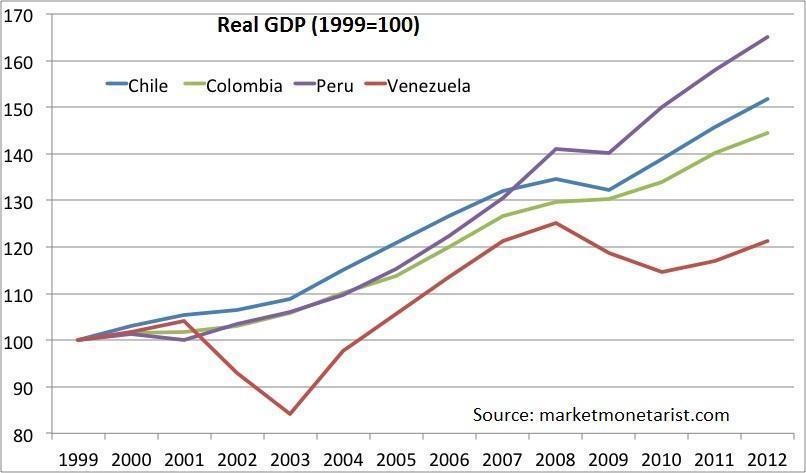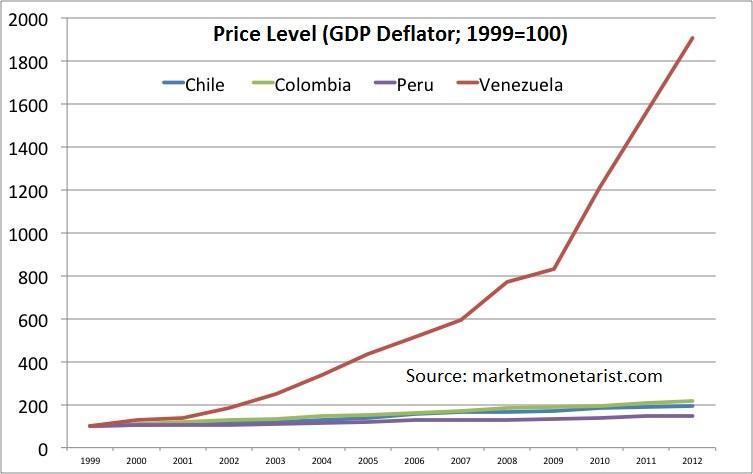Hugo Chávez’s economic legacy

After taking control of Cuba, Fidel Castro met with his top brass to choose his ministers. When the time came to appoint the Central Bank Governor, he asked whether there was an economist among them. Only Ernesto “Che” Guevara rose, and therefore got the job.
Later, in private, Fidel asked Che: “I thought you were a médico? I thought you were looking for a comunista, not an economista.” Che answered back, and that’s how
“the original comandante” became responsible for Cuba’s economy, so we should not be too hard on him. Hugo Chávez, also called comandante, in fact did have staff with training in the dismal science, but he still managed to mess up Venezuela’s economy.
The numbers speak for themselves. The country grew much less than Colombia, Chile and Peru, which have adopted free-market, business-friendly policies and recently formed
the Pacific Alliance with Mexico. Investment fell, capital flight worsened, foreign investment came to a stop, and the Caracas stock exchange all but disappeared. Chávez also managed to ruin the government-owned oil company
PDVSA, which used to be one the most successful state firms in the world.

But if the economy performed poorly, why was Chávez so popular? It is important to note that Venezuela is one of the most unequal countries in a continent with high levels of income inequality. In fact,
the Gini coefficient does not even do justice to the country! All the Venezuelans I knew in the United States had at most two degrees of separation from each other. It seemed as though a few thousand privileged were running the country.
More importantly, despite the huge oil wealth, there was widespread poverty when Chávez came to power in 1999, with one in four Venezuelans living on less than $2 a day. The poverty headcount ratio had fallen to 13 percent in 2006. To cut a long story short, Chávez simply distributed the nation’s oil wealth to the poor by increasing government spending. External debt and inflation shot up as a result.

Chávez was not the only South American leader running populist economic policies with a nationalistic and socialist twist. Just look at those who were right in front of his coffin: Presidents Cristina Kirchner of Argentina, Evo Morales of Bolivia and Rafael Correa of Ecuador, who is an economist by training. In fact, Venezuela has dual exchange rates and price caps
just like Argentina.
Unfortunately, these countries have fallen behind the liberal Pacific Alliance bloc and even Brazil. I admire Hugo for giving the disenfranchised some chance, just as I admire Evita for
being the saint of the “
descamisados.” But I doubt I would have voted for them, or Cristina and Evo for that matter, on account of their terrible economic policies alone.
In fact, I have yet to see a socialist regime that doesn’t mess up its economy. But it actually exists, if you don’t take the word too literally - it is called Scandinavia.
I should repeat my South American columns of the last month for the region as soon as I travel there again.
 After taking control of Cuba, Fidel Castro met with his top brass to choose his ministers. When the time came to appoint the Central Bank Governor, he asked whether there was an economist among them. Only Ernesto “Che” Guevara rose, and therefore got the job.
After taking control of Cuba, Fidel Castro met with his top brass to choose his ministers. When the time came to appoint the Central Bank Governor, he asked whether there was an economist among them. Only Ernesto “Che” Guevara rose, and therefore got the job.
